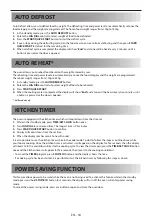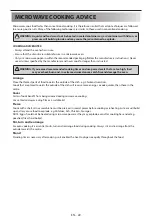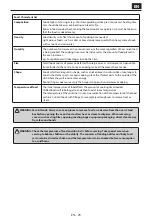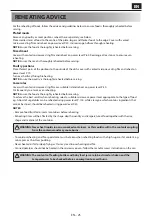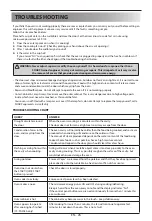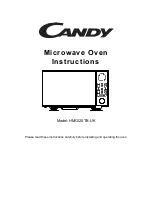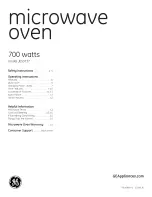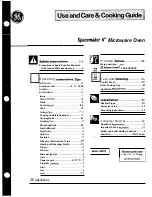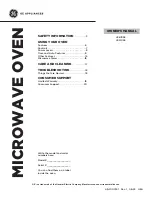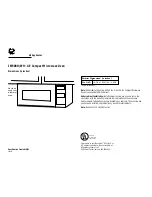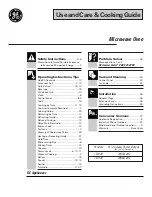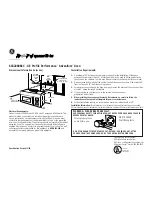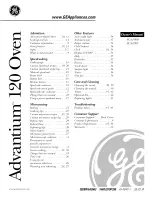
EN – 26
EN – 26
TROUBLESHOOTING
If you think the oven is not working properly there are some simple checks you can carry out yourself before calling an
engineer. This will help prevent unnecessary service calls if the fault is something simple.
Follow this simple check below:
Place half a cup of water on the turntable and close the door. Set the timer know to cook for 1 minute using
microwave power level of P-100.
1.
Does the oven lamp come on when it is cooking?
2.
Does the cooling fan work? (Check by placing your hand above the air vent openings).
3.
After 1 minute does the audible signal sound?
4.
Is the water in the cup hot?
If you answer “NO” to any question fi rst check that the oven is plugged in properly and the fuse has not blown. If
there is no fault with either, check against the troubleshooting chart below.
WARNING: Never adjust, repair or modify the oven yourself. It is hazardous for anyone other than a
SHARP trained engineer to carry out servicing or repairs. This is important as it may involve
the removal of covers that provide protection against microwave energy.
• The door seal stops microwave leakage during oven operation, but does not form an airtight seal. It is normal to see
drops of water, light or feel warm air around the oven door. Food with a high moisture content will release steam
and cause condensation inside the door which may drip from the oven.
• Repairs and Modifi cations: Do not attempt to operate the oven if it is not working properly.
• Outer Cabinet & Lamp Access: Never remove the outer cabinet. This is very dangerous due to high voltage parts
inside which must never be touched, as this could be fatal.
Your oven is not fi tted with a lamp access cover. If the lamp fails, do not attempt to replace the lamp yourself, call a
SHARP approved service facility.
TROUBLESHOOTING CHART
QUERY
ANSWER
Draught circulates around
the door.
When the oven is working, air circulates within the cavity.
The door does not form an airtight seal so air may escape from the door.
Condensation forms in the
oven, and may drip from the
door.
The oven cavity will normally be colder than the food being cooked, and so steam
produced when cooking will condense on the colder surface.
The amount of steam produced depends on the water content of the food being
cooked. Some foods, such as potatoes have a high moisture content.
Condensation trapped in the door glass should clear after a few hours.
Flashing or arcing from within
the cavity when cooking.
Arcing will occur when a metallic object comes into close proximity to the oven
cavity during cooking. This may possibly roughen the surface of the cavity, but
would not otherwise damage the oven.
Arcing potatoes.
Ensure all “eyes” are removed from the potatoes and that they have been pierced,
place directly onto the turntable in a heat resistant fl an dish or similar.
Oven does not work when
the START/QUICK START
button is pressed.
Check the door is closed properly.
Oven cooks too slowly.
Ensure correct power level has been selected.
Oven makes a noise.
The microwave energy pulses ON and OFF during cooking/defrosting.
Bleep is heard from the oven every minute and the display indicates "Fail"
If the control panel buttons are pressed continuously for more than 1 minute this
error will occur.
Outer cabinet is hot.
The cabinet may become warm to the touch - keep children away.
Oven appears to operate
after cooking has fi nished
(YC-PG204A only).
After cooking for more than 2 minutes, the fan will continue to operate for 3
minutes to cool down the oven. This is not a fault.







